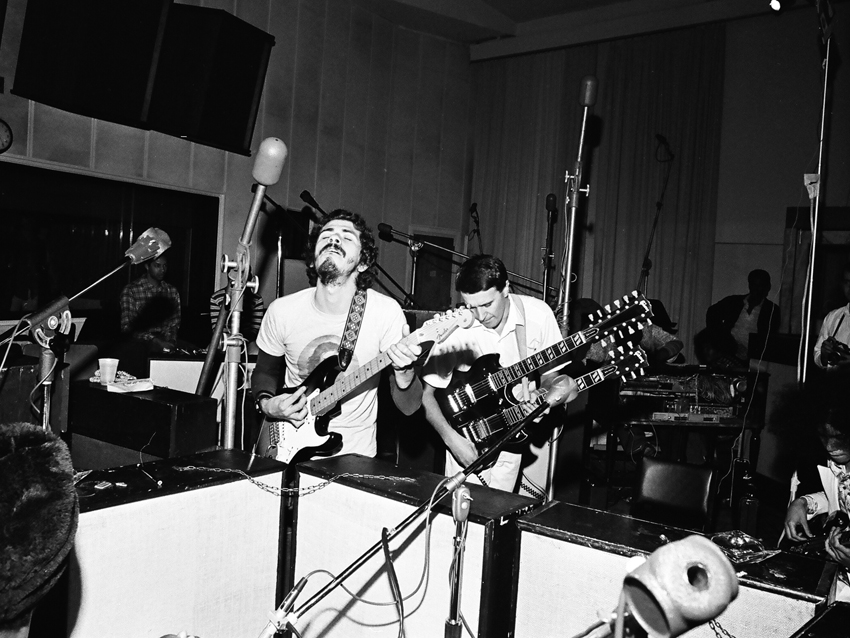
Exclusive book excerpt: Carlos Santana's The Universal Tone
In his just-published memoir, The Universal Tone: Bringing My Story To Light, guitar legend Carlos Santana takes readers on a compelling and uplifting journey through his life and career, from a meager childhood in Tijuana to hitting the stage at the Fillmore during the Summer Of Love, to triumph at Woodstock, international success and the many musical vicissitudes that have attended his career over the past five decades.
"A lot of musicians write that one kind of book, but that's just not my trip," Santana tells MusicRadar. "Writing this book, I wanted to respect the three words that I love every day: Elevate, transform and illumine. That goes for off stage, on stage, at home, anywhere. When you’re able to elevate, transform and illumine, you’re able to get beyond fear. Fear has a way of making people cynical; they become the worst version of themselves.
“There's something I've grown to realize in life, and it's something I experienced in writing this book," he continues. "I want to be the opposite of cynical. I want to be vulnerable, like a seven-year-old child, with openness and trust and purity and sincerity." He laughs, then adds, "Let's face it, man. Being cynical is dead in the water. It’s a waste of time, a waste of everything. I hope this book can maybe help some people get beyond all that negativity.”
In this full-chapter excerpt from The Universal Tone, Santana describes his attitudes about religion and spirituality, his need to share what he calls "a dose of reality" in his concerts, as well as his ongoing battle with ego. You can purchase Carlos Santana's The Universal Tone: Bringing My Story To Light, published by Little, Brown and Company, at Barnes & Noble.
The Universal Tone: exclusive excerpt
I’d love to share something with you—I really get high on gratitude.Gratitude is one of the highest things that a human being can aspire to because when you're grateful you go beyond the halo and the horns. Halo and horns are just words for energy with the guilt. Angels and demons, they give you a standing ovation when you do your best to be grateful. I invite you this second, this moment to embrace unconditional love. Unconditional love is a love that is greater than your issues, greater than your luggage and baggage and illusions. Love makes you and me necessary as opposed to unnecessary. Love does away with distance or separation. Love takes all the flags of the world and turns them into a river of colors. Love is the light that is inside all of us, everyone. I salute the light that you are and that is inside your heart. I salute you.
Anyone who’s seen a Santana show in recent years knows I like to inject a dose of reality into the concert. Four or five songs along, maybe after we’ve played “Black Magic Woman” and “Oye Como Va” and just before “Maria, Maria”, the singers will take a break and I’ll start talking to the crowd. I’ll welcome them to the show, and then tell people about the light that they each have inside them, that they are light—luminous is the word I like to use. I ask them to please consider accepting the nobility and greatness of their lives. Please consider acknowledging that so you’re not separate from your own light, which is what so much of our culture and religion wants to condition us to believe—that you’re not worthy, that you’re a wretched sinner, that you came into this world a sinner before you even opened your eyes for the first time. That you need to atone, and that you’re alone.
Sometimes at that point someone will scream, or they’ll yell that they want to rock, and I’ll say, “Hey man, just listen for a moment. I’m grateful you paid for a ticket and I know the songs you want to hear, but here’s something maybe you need to hear even more. How about a higher level of consciousness for a minute?”
I feel that now, in this part of the book, I want to stop like I do in concert and say a few things that connect the dots. I want to explain again why I’m doing this book, talk about the Universal Tone and remind everyone that this is not just a saying—we really are all one. I hang all my beliefs on that one note.
I’m many things—a father, a husband, a guitar player, a bandleader, and a believer. I’m also a preacher and a teacher—that’s a big part of who I am now and it comes from the work I have done on myself, starting years ago with the teachers I decided to follow. One of the most important lessons I learned was to listen to what they were saying, and also to take the time to stop and listen to myself. There’s a very noble concept that Eastern Buddhists have—you are the gardener of your own mind. It’s the idea that you have to take responsibility for your thoughts, to catch and stop yourself from thinking thoughts that are inappropriate or hurtful.
NEXT: "The ego is not your friend"
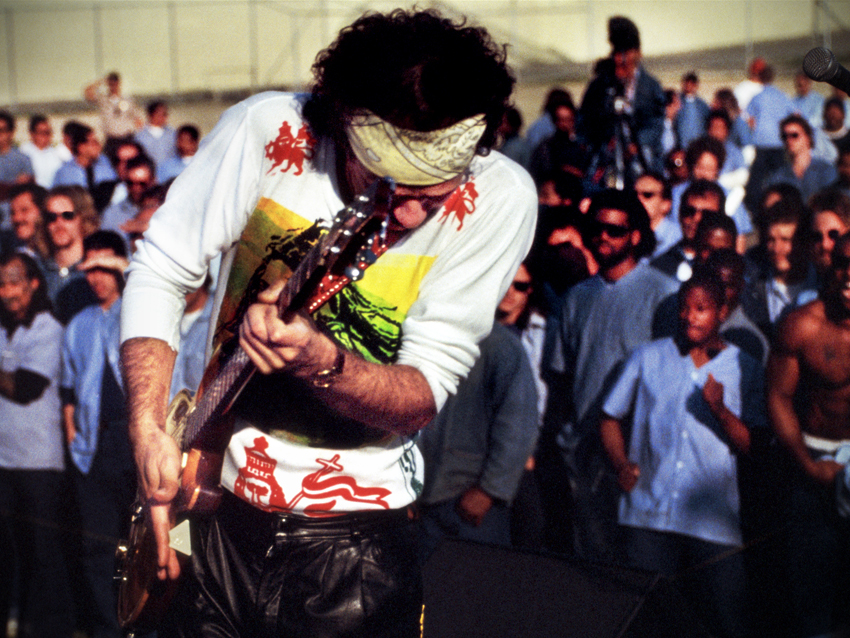
"The ego is not your friend"
We should write it in big block letters: THE EGO IS NOT YOUR FRIEND. The ego likes doubt, and it will criticize and guilt-trip you to death. It will condemn and judge, and draw you into a pit and then laugh at you. That's why meditation can be very hard. It’s easy to do nothing but it is very, very difficult to think nothing. You can never really do that anyway—the thing is to step back from all those thoughts, like getting out of a rushing river and then just sit there and let it keep going anyway. Meditation is the first step to controlling all that talk, talk, talk that keeps going on inside all of us, so you can finally decide who you’re going to trust—your light or your ego—and can you tell the difference?
For a long time I have thought about the exchange between Eastern philosophy and the Western mind in the 1960s and the relationship between the two. There were many gurus and spiritual teachers coming around during that time, and they each had different priorities and paths you could follow even if the basic message was the same. There was no guidebook or website you could go on to know which one was best for you. You had to listen to each with your heart and common sense, and see who else was hanging around with them and decide if their way of talking and their requirements and discipline made sense for you. If they were real gurus, their message was about love and connection.
It was an exciting time and the ideas that these gurus were bringing to us was like adding light to a map that was always there, but we just couldn’t see it. Suddenly there were all these other paths that we could take that we didn’t know existed. Even today, I think that Eastern philosophy is like this wise, older uncle trying to help the Western mind, which can be enmeshed in adolescence, acting like a spoiled teenager wanting to party, smelling like unwashed socks and beer. Those gurus came on the scene teaching how to be more spiritual at a time when I needed that, helping me face that part of my life with maturity.
There’s a big difference between religion and spirituality. From what I know now you can only believe in both if you are willing to take personal responsibility. If you see yourself not as a drop of water but as a part of an entire ocean, a part of everyone and everything. If you can master that idea, and you can master the ego, which many religions count on you not being able to do, then you know your responsibility is not just to yourself, but to everything—loving yourself is loving others and hurting others is only hurting yourself. If you believe this then it doesn’t make sense that there can be only one religion, and that you’re going to see God and everyone else is wrong and going to hell.
I don’t buy into that idea that only one kind of people gets to walk the red carpet, you know? You can keep the kind of heaven that’s selective. I want the heaven that’s for everybody. Recently I was with Archbishop Desmond Tutu and he heard that someone had said that heaven was reserved for heterosexuals only, and he said, if heaven doesn’t allow homosexuals, then that’s not the heaven I want to go to. I agree 100%.
NEXT: "You can't do it by yourself all the time"
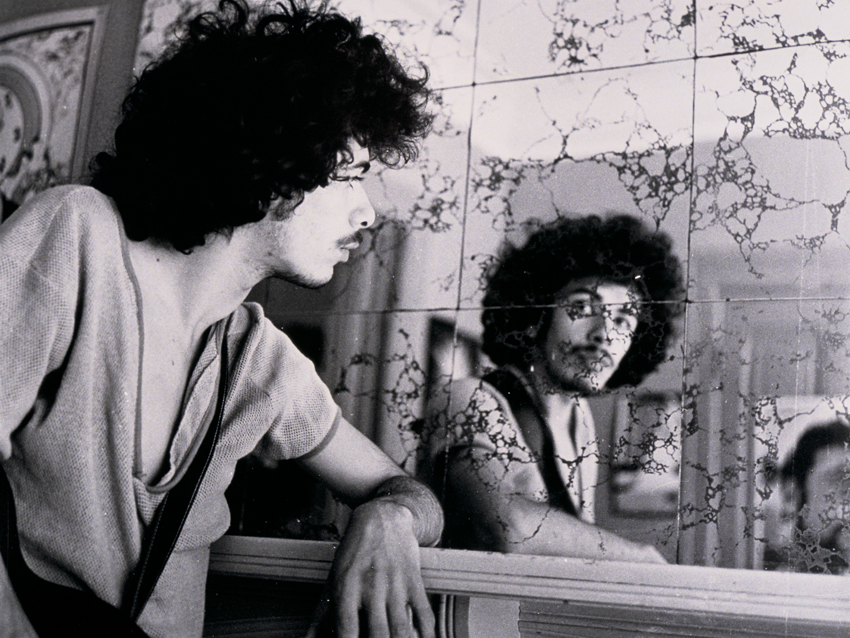
"You can't do it by yourself all the time"
That's where Sri Chinmoy really helped me the most. He would say that there is only one goal but there are many paths, and that each religion is right in its own way. In the West we have a way of thinking that comes down to this: the devil made me do it, but Jesus has got my back. Another way of saying it is, the devil made me do it but Jesus will still carry me across the river of life. Damn. What sort of responsibility is that? Even if you didn’t do anything the devil told you to, just how many people does Jesus have to carry? How about climbing down and doing some of the walking?
Even before 1972 and making Caravanserai and getting together with Deborah and meeting Sri, I had made a conscious decision to step away from the churning of conflicts and ego games in my life. It was a once-in-a-while thing but it was a dedicated thing, regardless of the consequences, no matter what people say, if they came along with me or not, even if I was on my own.
The reason for gurus is that you can’t do it by yourself all the time—definitely not at the beginning. You need someone else to hold up the light so you can see where you’re going on this new road. A true guru is someone who brings light and is a dispeller of darkness. Jesus was a guru. Sometimes it’s nothing that they say or do, but how they change things around them with just their presence—like Miles onstage in the 1970s with all those musicians, not saying anything or even blowing into the trumpet, just looking this way or that or walking up to someone and then they’d stop playing shit and the whole focus of the music would shift. That's how a guru works.
John McLaughlin used to tell me Miles would say to him, “Don’t forget—I was your first guru.” Miles could be funny but he wasn’t wrong.
I think that's why gurus and Eastern teachers sought out musicians—because people pay attention to them. Those gurus were smart—they knew what they were doing. They weren’t going to take out ads or do radio commercials. They were talking and a lot of people were listening, and a lot of them were musicians who other people were listening to. I’m not sure why so many musicians were going that way but I know for everyone there comes a time when people have to make the move for their own betterment. Even the oldest turtle with the hardest shell has to stick its neck out once in a while—and I think it was easier to do that then, than it is now. The Beatles stuck their neck out with the Maharishi. Before them John Coltrane was reading Krishnamurti and talking about it with people, educating himself on spiritual principles.
People might still wonder about that—which musicians went with which gurus and for how long. But that’s a distraction—the point is not who studied with whom, it was the “why”. It was because of needing to evolve and elevate, and then share that with other human beings, to send letters home from the frontline while I was waging the battle over the ego. I was with Sri Chinmoy for almost ten years but my spiritual path never stopped.
NEXT: "Being human is not easy for anyone"
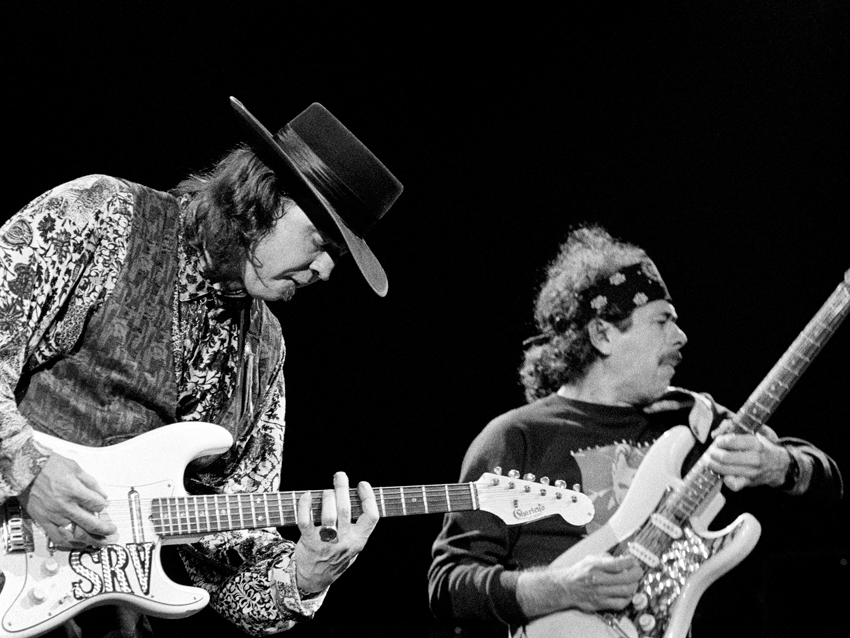
"Being human is not easy for anyone"
I think you can guess by now that the ego battle is never totally won. It takes diligence and from the start, it’s got to be a gentle transformation with a lot of patience and willingness. Even after you learn to meditate and to focus every day on love, devotion, and surrender, every day is also a chance to fall back into old habits. Even now, I must remember to let my ego go and to stop investing in the illusion of separation and unworthiness. It’s a day-to-day thing.
Sri used to say that at every moment we have to decide if we want the division-desiring mind or the union-aspiring heart. The way I used to think about it was this way: when Santana was flying around the world in the ‘70s and ‘80s, we’d be up above the clouds. I’d look out the window at this big, soft blanket where everything was sunny and quiet and looking perfect. But I knew in an hour or so we had to go back through the clouds and deal with whatever was happening underneath, just waiting for us.
Being human is not easy for anyone. Everyone has to deal with their own humanness. If we all could just tell ourselves, over and over, that the spark of the divine in us will triumph over our feet of clay—done.
It took years to say that with confidence about myself, and to be able to speak about my convictions in public and onstage. But there's no magic bullet that will work for everyone, no perfect master you can go to who can fix everything for you. I learned many things from Sri Chinmoy. Then it was time for me to learn on my own, and from others. These days, there are two wonderful thought-adjusters—Jerry Jampolsky and Diane Cirincione—who help me stay on the path with their gentle wisdom. I also read from the book A Course In Miracles everyday and discuss its message with the authors and try to apply its spiritual principles.
In the end, I think everybody has their own experiences and their own emergencies. They need to consider the choices and listen to the messages that different people have for them and choose a path for themselves. I think that everybody is meant to find their own way home.
I believe I am a spiritual kind of person who’s well-rounded and balanced. I like to laugh and don’t carry this stuff around like it’s some heavy message that needs to be weighed and delivered with special handling. To be enlightened means to be light in all senses of that word.
There’s a story I’ve heard about the two monks who made vows of chastity, never to touch a woman. They’re walking along and come to a river where this beautiful girl asks for their help getting to the other side. So one of them lets her get on his shoulders and carries her across. A little while later the monk who helped the girl sees that the other is all angry and upset. He asks what’s wrong. “What about our vows? How could you carry her?” he says. The first monk looks at him. “Hey, I put her down a long time ago—you’re the one still carrying her.”
NEXT: "The Universal Tone"
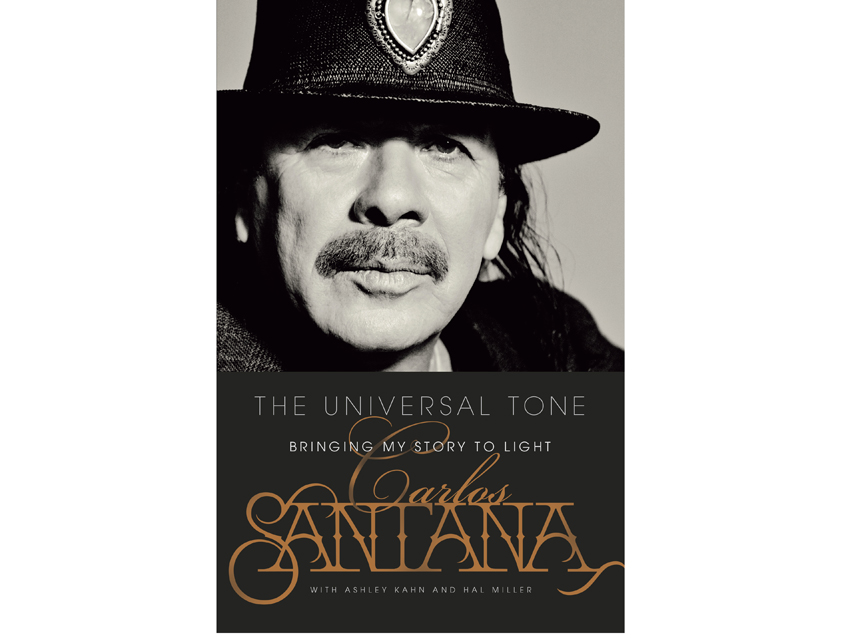
"The Universal Tone"
I’m still going to share during my shows—that’s just who I am, and I think people need to hear what I have learned. And if you listen—really listen—you can hear the message in all the music that I play, the Universal Tone that I speak about.
It’s not just my music either, at all—the Universal Tone lives in any number of songs that speak with the same message of love and connection, that take away the filters and reveal the best of who we are and who we can be. Sam Cooke— “A Change Is Gonna Come.” Marvin Gaye—“ What's Goin’ On.” John Lennon—“Imagine.” Bob Marley—“One Love.” John Coltrane—“A Love Supreme.” Even “Row, Row, Row Your Boat” with the line that goes “merrily, merrily, merrily/Life is but a dream.” These are songs that time cannot wither or diminish.
Thank you for being here. We love touching you with our music and when you leave this place and you wake up tomorrow and you have to deal with you, I invite you to look in the mirror and say this is going to be the best day of my life. Say it with clarity and soulfulness and sincerity. When you can say that, then you truly are divine and I salute you because I can see Christ in you, I see Buddha, Krishna, Allah, Rama, Shango. I see holiness in you. If you remember anything from tonight let it be this and say, “Hey, that Mexican, he said it is my choice. It is my choice alone. I can create heaven on earth.” God bless you, be kind to one another—A Love Supreme, One Love, Imagine, thank you. Good night.
From the book THE UNIVERSAL TONE: Bringing My Story to Light by Carlos Santana with Ashley Kahn and Hal Miller. Copyright © 2014 by Carlos Santana Trust of 2011. Reprinted by permission of Little, Brown and Company, New York, NY. All rights reserved.
Joe is a freelance journalist who has, over the past few decades, interviewed hundreds of guitarists for Guitar World, Guitar Player, MusicRadar and Classic Rock. He is also a former editor of Guitar World, contributing writer for Guitar Aficionado and VP of A&R for Island Records. He’s an enthusiastic guitarist, but he’s nowhere near the likes of the people he interviews. Surprisingly, his skills are more suited to the drums. If you need a drummer for your Beatles tribute band, look him up.
